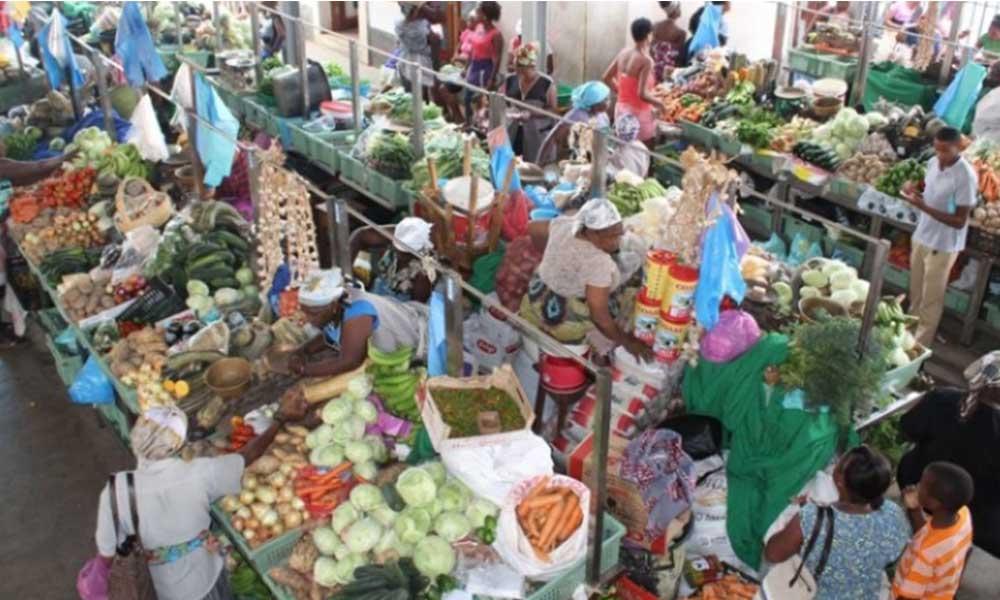Africa-Press – Cape verde. Saleswomen at the Plateau market continue to complain about the consequences of the pandemic, drought and war in Ukraine, with repercussions on the decrease in demand for their products… But they also complain about the disorganization that has taken place since the pandemic and reveal that it is beginning to nightmare to stay on the market.
These days, the historic Platô market seems to be living far from its best days.
That is, like almost everything else in Cape Verde, this once barometer of life in the capital continues to suffer from the “triple crisis”, as the covid pandemic, drought and war in Ukraine has been called. Mostly women, some of the saleswomen, more in tune with reality and the world, ask when the war in Ukraine, for example, will end, so they can get out of the “affront” they are in.
“Things were already in decline before the pandemic, but, at that time, it was still selling well, it was enough to live on, but now there are days when I don’t sell even a kilo, it’s sad and desperate…”, says a saleswoman, who He also complains about the disorganization and lack of supervision in the Platô pillory.
“Before it was vegetables down there and up here it was just fruit, but not now, you can find everything down there, so customers don’t even come to the first floor anymore”, he adds.
When questioned about the prices they are practising, our interviewees answer that it is impossible to lower them, under penalty of losing money.
Even so, they reveal that, at this moment, products such as papaya and tomatoes have already started to be sold at much lower prices than a few weeks ago. But even so, they say, customers continue to complain about prices.
“We’re buying a kilo of sweet potatoes at 160 escudos, for example, and we sell it at 180. In the vast majority of products we only manage to earn 20 escudos for each kilo, which is obviously not worth it. Every day we need transport, we buy water to wash the vegetables, many customers ask for discounts and sometimes we take 10 escudos off the price, but we can’t do that… It is obvious that the earnings are not enough to cover all the expenses at the end of the year. month”.
Another situation observed is that some saleswomen who work in the Plateau market have contracted debts in order to maintain and maintain their respective businesses, which include the payment of the “stones”.
They allege that if there is no change, they too, like others, will end up leaving the market to go and sell on the street, with a “bullet to the head”.
“Unfortunately I have debts that I contracted throughout the pandemic to continue selling my products, the bills are very tight, if I were alone, just with what I earn in this market, it would be impossible to survive… I thank God that it is me and my mate”, vents another saleswoman.
Our interviewees revealed to us that, in order to survive, they try to help each other, buying from each other what they need for their consumption, thus seeking to “unburden” a business that has long shown signs of failure.
“We’ve been doing a kind of ‘adjunta mô’, we do business with those who work at Sucupira and with our colleagues who work here, we who have been trying to guarantee each other the end of the month”, says one of the saleswomen.
Reselling or exchanging products between saleswomen is an old practice, but it has intensified after the pandemic, especially in the last four months. As they allege, the crisis has made life more difficult for those who earn a living in the Plateau market.
Unfair competition ‘versus’ Ineffective inspection
Unfair competition was another point that practically all the interviewees in this report touched on. In general, they are categorical in stating that those who left the market did not stop selling, they simply started to do it on an itinerant basis, with a “bullet to the head”, and some even in cars, through the neighborhoods.
“Before, you didn’t see saleswomen on the street or in cars selling throughout the capital, as there was a market and municipal supervision worked”, says one of our interviewees, for whom, before the pandemic crisis, municipal supervision tightened the siege but who nowadays seem to “turn a blind eye” to such situations.
“We don’t condemn a person who buys from street vendors or from cars; after all, it’s always closer and sometimes cheaper. What we do not accept is the idea of having markets and municipal inspections do nothing against those who, against the law, sell on the street or in cars. And we all know that before the pandemic the market was
organized and the street vendors were very few”, highlights another.
They remembered that those who remain in the market pay for being there and those who wander around the city do not. These, in addition to selling the cheapest products, sell everything and make the customer stop going to the market, as he
finds everything “on the doorstep”.
What they are asking for is a standardization of the sector.
And the customers?
The few customers that this report found in the Platô market complained about the prices and some even complained about the quality of the products on display. Even on a Saturday, traditionally market day, the place was not very crowded. The few customers, as far as we could see, were demanding when opening their purse strings.
“Before, I always came to the market, the prices were good and the quality too, but now I hardly ever come, and when I come I only take the essentials, and even then the prices are high… Every time I come here I am surprised by the prices… In my case, the ‘visit’ is counted down to the cents, because life is expensive for everyone”, confesses one of the clients.
In her case, that citizen says she has been getting supplies from other places. “Nowadays, even Chinese stores have vegetables, usually at better prices, or I buy them from street vendors. There are products that are 30 escudos cheaper per kilo”, he guarantees.
The executive director of the Public Supply Service of the Municipality of Praia-SEPAMP, José Carlos Moniz, told A NAÇÃO that, of the 534 stalls available in the Platô market, only twenty are free.
Asked why many of the “stones”, as the stalls are known, are deserted, the official claimed that this is due to the fact that the owners of these spaces prefer to sell on the street and that it has been a permanent challenge to “eliminate situations from the type”.
“Managing the Plateau market has not been an easy task”, he vented, regarding the problems he was confronted with by A NAÇÃO.
Moniz says that several changes have already been made in order to have an organized market and for the saleswomen to remain in place, instead of walking down the street.
Thus, the price of the stalls increased from 110 escudos a day to 510 monthly (about 16 escudos a day), a division was established (vegetables on the ground floor and fruit on the first floor), tightening of hygiene and safety conditions for all products, mainly meat, among other measures.
“There is already a project, still awaiting funding, where we want to transform the ‘Cotxi Pó’ market, in Ponta Belém, into a logistics, supply and purge market for the Plateau market. This will be a way of organizing activities in the two markets, making the Platô market an exhibition and sales market, since there is no
space to store products”, he says.
NAÇÃO also tried to get reactions from the Municipal Guard on the inspection of street vendors, but it was not possible. The problem is that GM is, at the moment, without a director and the regional coordinator, Ivanildo Lopes, says he cannot make statements on the matter.
For More News And Analysis About Cape verde Follow Africa-Press






